Report on Understanding Specific Needs in Healthcare: HSC
VerifiedAdded on 2019/12/03
|11
|3246
|25
Report
AI Summary
This report delves into the crucial aspects of understanding specific needs within healthcare, using a case study of Mr. Holland Park, an individual in the early stages of dementia. It examines the concepts of health, disability, illness, and behavior, emphasizing the evolving perceptions of specific needs and the impact of legislation, social policy, and cultural factors on service delivery. The report outlines the care needs of individuals with specific needs, exploring current support systems and available services in East London. Furthermore, it analyzes various approaches and interventions, such as self-help, technological advancements, and guardianship, while assessing their effectiveness in supporting individuals with specific needs, contributing to improved patient outcomes and overall healthcare quality. The report highlights the significance of adapting services to meet diverse needs and the role of effective communication and knowledge sharing among healthcare providers.
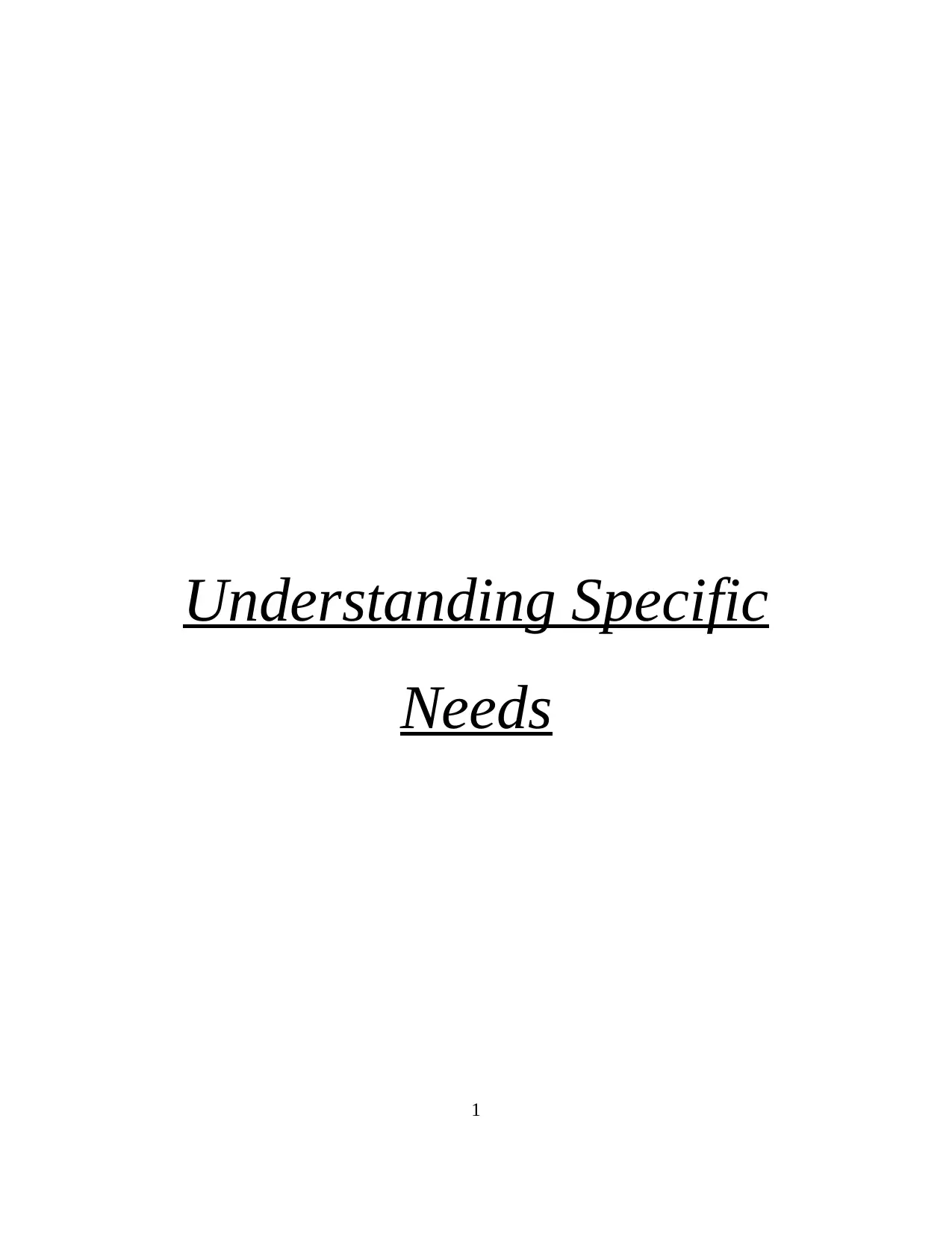
Understanding Specific
Needs
1
Needs
1
Paraphrase This Document
Need a fresh take? Get an instant paraphrase of this document with our AI Paraphraser
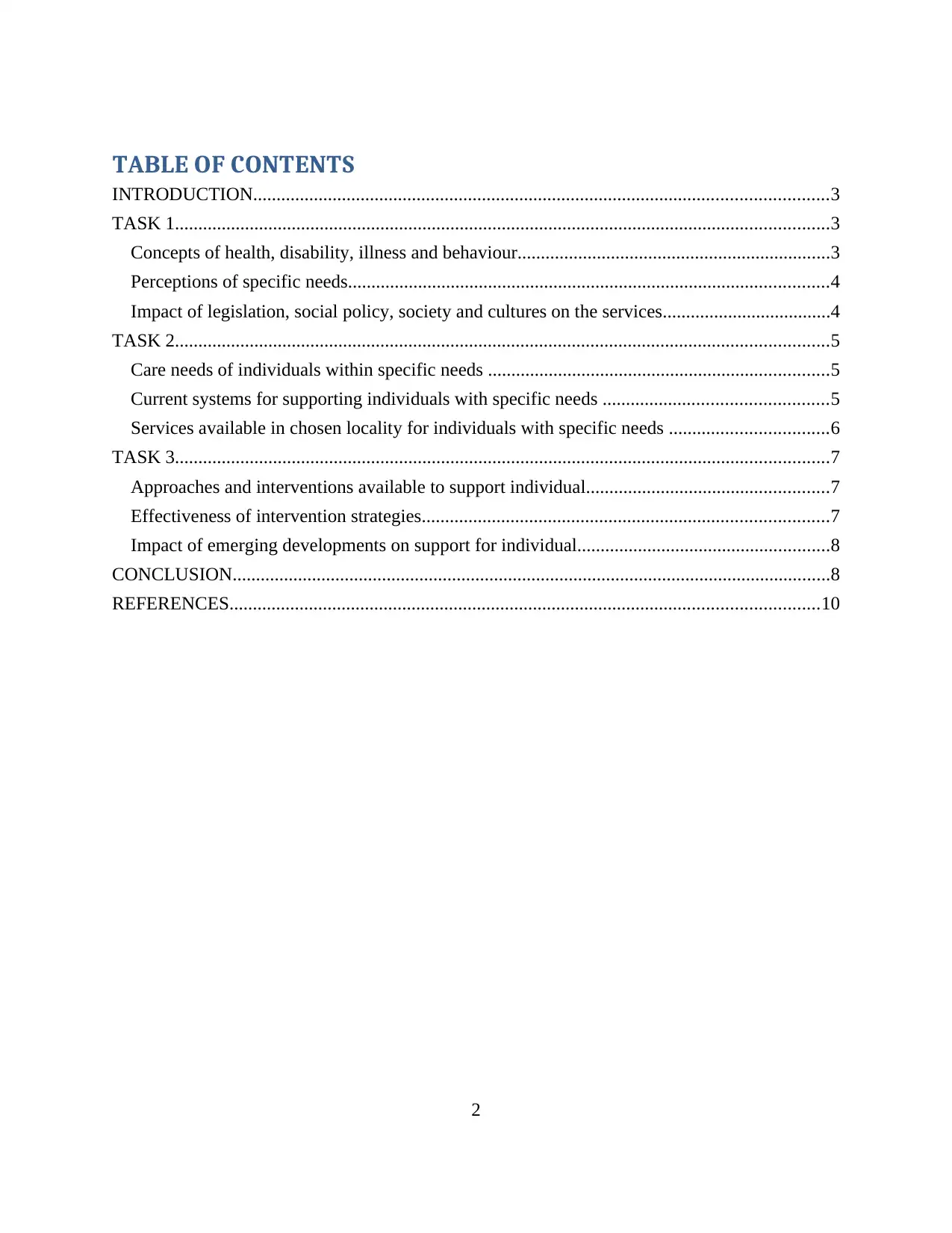
TABLE OF CONTENTS
INTRODUCTION...........................................................................................................................3
TASK 1............................................................................................................................................3
Concepts of health, disability, illness and behaviour...................................................................3
Perceptions of specific needs.......................................................................................................4
Impact of legislation, social policy, society and cultures on the services....................................4
TASK 2............................................................................................................................................5
Care needs of individuals within specific needs .........................................................................5
Current systems for supporting individuals with specific needs ................................................5
Services available in chosen locality for individuals with specific needs ..................................6
TASK 3............................................................................................................................................7
Approaches and interventions available to support individual....................................................7
Effectiveness of intervention strategies.......................................................................................7
Impact of emerging developments on support for individual......................................................8
CONCLUSION................................................................................................................................8
REFERENCES..............................................................................................................................10
2
INTRODUCTION...........................................................................................................................3
TASK 1............................................................................................................................................3
Concepts of health, disability, illness and behaviour...................................................................3
Perceptions of specific needs.......................................................................................................4
Impact of legislation, social policy, society and cultures on the services....................................4
TASK 2............................................................................................................................................5
Care needs of individuals within specific needs .........................................................................5
Current systems for supporting individuals with specific needs ................................................5
Services available in chosen locality for individuals with specific needs ..................................6
TASK 3............................................................................................................................................7
Approaches and interventions available to support individual....................................................7
Effectiveness of intervention strategies.......................................................................................7
Impact of emerging developments on support for individual......................................................8
CONCLUSION................................................................................................................................8
REFERENCES..............................................................................................................................10
2
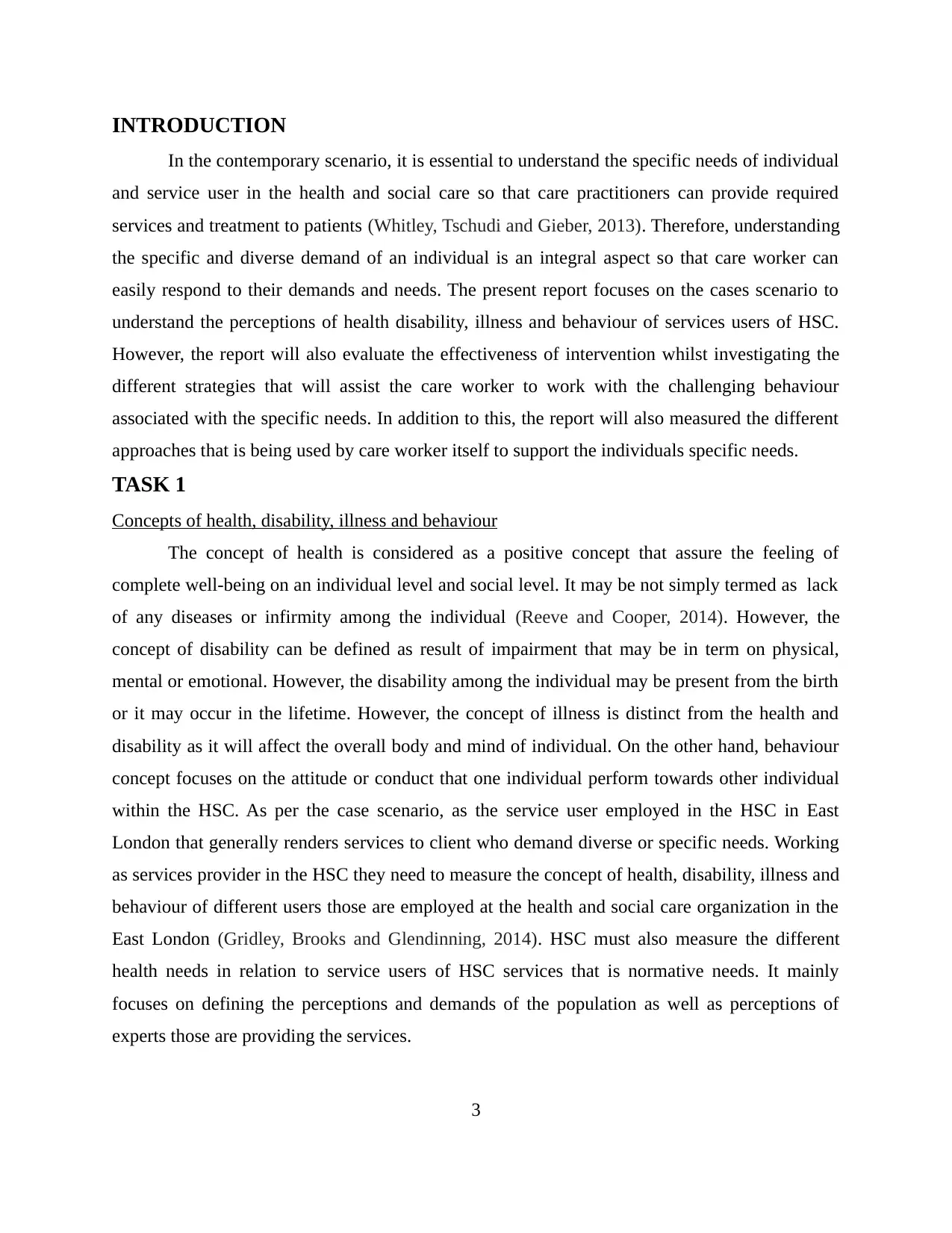
INTRODUCTION
In the contemporary scenario, it is essential to understand the specific needs of individual
and service user in the health and social care so that care practitioners can provide required
services and treatment to patients (Whitley, Tschudi and Gieber, 2013). Therefore, understanding
the specific and diverse demand of an individual is an integral aspect so that care worker can
easily respond to their demands and needs. The present report focuses on the cases scenario to
understand the perceptions of health disability, illness and behaviour of services users of HSC.
However, the report will also evaluate the effectiveness of intervention whilst investigating the
different strategies that will assist the care worker to work with the challenging behaviour
associated with the specific needs. In addition to this, the report will also measured the different
approaches that is being used by care worker itself to support the individuals specific needs.
TASK 1
Concepts of health, disability, illness and behaviour
The concept of health is considered as a positive concept that assure the feeling of
complete well-being on an individual level and social level. It may be not simply termed as lack
of any diseases or infirmity among the individual (Reeve and Cooper, 2014). However, the
concept of disability can be defined as result of impairment that may be in term on physical,
mental or emotional. However, the disability among the individual may be present from the birth
or it may occur in the lifetime. However, the concept of illness is distinct from the health and
disability as it will affect the overall body and mind of individual. On the other hand, behaviour
concept focuses on the attitude or conduct that one individual perform towards other individual
within the HSC. As per the case scenario, as the service user employed in the HSC in East
London that generally renders services to client who demand diverse or specific needs. Working
as services provider in the HSC they need to measure the concept of health, disability, illness and
behaviour of different users those are employed at the health and social care organization in the
East London (Gridley, Brooks and Glendinning, 2014). HSC must also measure the different
health needs in relation to service users of HSC services that is normative needs. It mainly
focuses on defining the perceptions and demands of the population as well as perceptions of
experts those are providing the services.
3
In the contemporary scenario, it is essential to understand the specific needs of individual
and service user in the health and social care so that care practitioners can provide required
services and treatment to patients (Whitley, Tschudi and Gieber, 2013). Therefore, understanding
the specific and diverse demand of an individual is an integral aspect so that care worker can
easily respond to their demands and needs. The present report focuses on the cases scenario to
understand the perceptions of health disability, illness and behaviour of services users of HSC.
However, the report will also evaluate the effectiveness of intervention whilst investigating the
different strategies that will assist the care worker to work with the challenging behaviour
associated with the specific needs. In addition to this, the report will also measured the different
approaches that is being used by care worker itself to support the individuals specific needs.
TASK 1
Concepts of health, disability, illness and behaviour
The concept of health is considered as a positive concept that assure the feeling of
complete well-being on an individual level and social level. It may be not simply termed as lack
of any diseases or infirmity among the individual (Reeve and Cooper, 2014). However, the
concept of disability can be defined as result of impairment that may be in term on physical,
mental or emotional. However, the disability among the individual may be present from the birth
or it may occur in the lifetime. However, the concept of illness is distinct from the health and
disability as it will affect the overall body and mind of individual. On the other hand, behaviour
concept focuses on the attitude or conduct that one individual perform towards other individual
within the HSC. As per the case scenario, as the service user employed in the HSC in East
London that generally renders services to client who demand diverse or specific needs. Working
as services provider in the HSC they need to measure the concept of health, disability, illness and
behaviour of different users those are employed at the health and social care organization in the
East London (Gridley, Brooks and Glendinning, 2014). HSC must also measure the different
health needs in relation to service users of HSC services that is normative needs. It mainly
focuses on defining the perceptions and demands of the population as well as perceptions of
experts those are providing the services.
3
⊘ This is a preview!⊘
Do you want full access?
Subscribe today to unlock all pages.

Trusted by 1+ million students worldwide
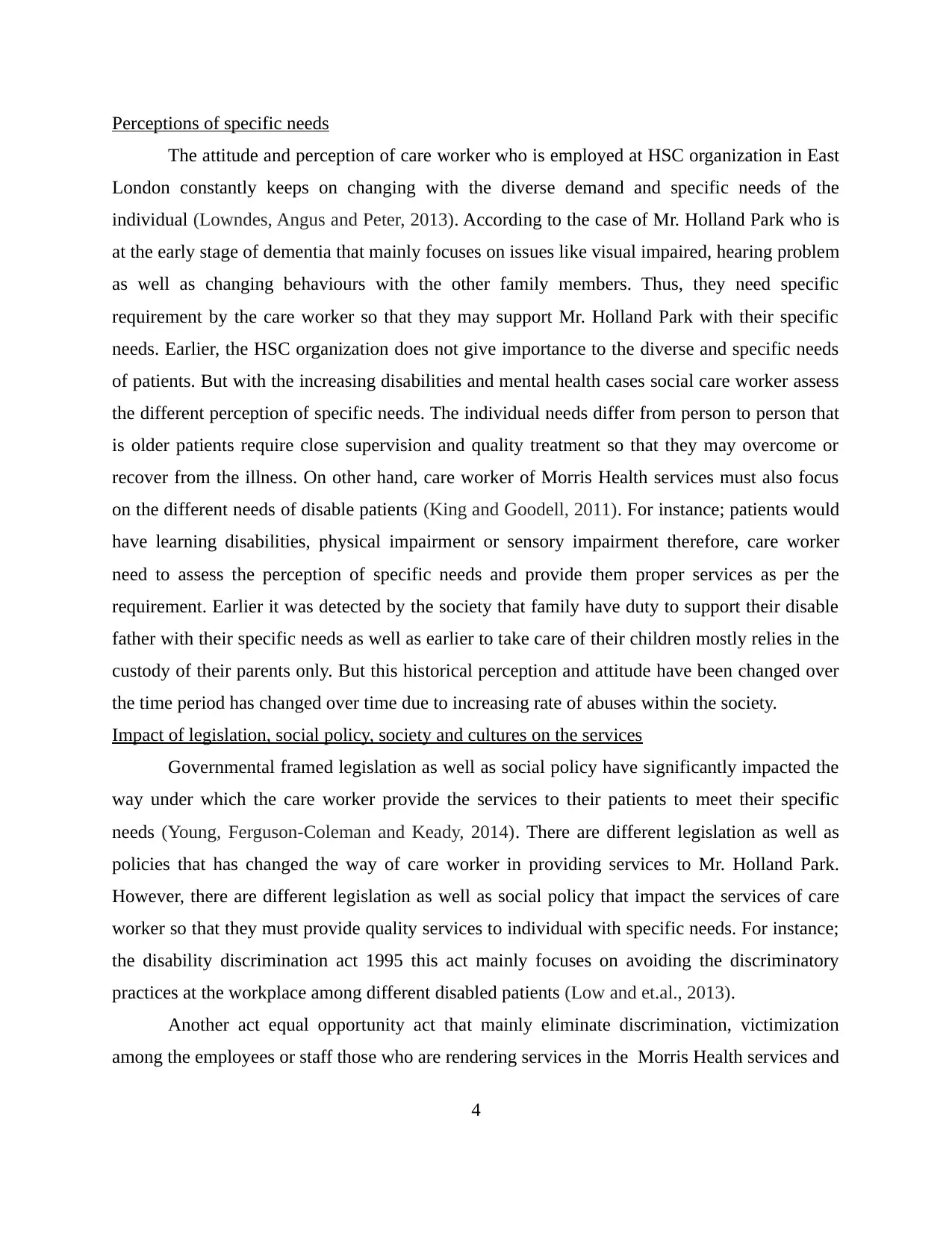
Perceptions of specific needs
The attitude and perception of care worker who is employed at HSC organization in East
London constantly keeps on changing with the diverse demand and specific needs of the
individual (Lowndes, Angus and Peter, 2013). According to the case of Mr. Holland Park who is
at the early stage of dementia that mainly focuses on issues like visual impaired, hearing problem
as well as changing behaviours with the other family members. Thus, they need specific
requirement by the care worker so that they may support Mr. Holland Park with their specific
needs. Earlier, the HSC organization does not give importance to the diverse and specific needs
of patients. But with the increasing disabilities and mental health cases social care worker assess
the different perception of specific needs. The individual needs differ from person to person that
is older patients require close supervision and quality treatment so that they may overcome or
recover from the illness. On other hand, care worker of Morris Health services must also focus
on the different needs of disable patients (King and Goodell, 2011). For instance; patients would
have learning disabilities, physical impairment or sensory impairment therefore, care worker
need to assess the perception of specific needs and provide them proper services as per the
requirement. Earlier it was detected by the society that family have duty to support their disable
father with their specific needs as well as earlier to take care of their children mostly relies in the
custody of their parents only. But this historical perception and attitude have been changed over
the time period has changed over time due to increasing rate of abuses within the society.
Impact of legislation, social policy, society and cultures on the services
Governmental framed legislation as well as social policy have significantly impacted the
way under which the care worker provide the services to their patients to meet their specific
needs (Young, Ferguson‐Coleman and Keady, 2014). There are different legislation as well as
policies that has changed the way of care worker in providing services to Mr. Holland Park.
However, there are different legislation as well as social policy that impact the services of care
worker so that they must provide quality services to individual with specific needs. For instance;
the disability discrimination act 1995 this act mainly focuses on avoiding the discriminatory
practices at the workplace among different disabled patients (Low and et.al., 2013).
Another act equal opportunity act that mainly eliminate discrimination, victimization
among the employees or staff those who are rendering services in the Morris Health services and
4
The attitude and perception of care worker who is employed at HSC organization in East
London constantly keeps on changing with the diverse demand and specific needs of the
individual (Lowndes, Angus and Peter, 2013). According to the case of Mr. Holland Park who is
at the early stage of dementia that mainly focuses on issues like visual impaired, hearing problem
as well as changing behaviours with the other family members. Thus, they need specific
requirement by the care worker so that they may support Mr. Holland Park with their specific
needs. Earlier, the HSC organization does not give importance to the diverse and specific needs
of patients. But with the increasing disabilities and mental health cases social care worker assess
the different perception of specific needs. The individual needs differ from person to person that
is older patients require close supervision and quality treatment so that they may overcome or
recover from the illness. On other hand, care worker of Morris Health services must also focus
on the different needs of disable patients (King and Goodell, 2011). For instance; patients would
have learning disabilities, physical impairment or sensory impairment therefore, care worker
need to assess the perception of specific needs and provide them proper services as per the
requirement. Earlier it was detected by the society that family have duty to support their disable
father with their specific needs as well as earlier to take care of their children mostly relies in the
custody of their parents only. But this historical perception and attitude have been changed over
the time period has changed over time due to increasing rate of abuses within the society.
Impact of legislation, social policy, society and cultures on the services
Governmental framed legislation as well as social policy have significantly impacted the
way under which the care worker provide the services to their patients to meet their specific
needs (Young, Ferguson‐Coleman and Keady, 2014). There are different legislation as well as
policies that has changed the way of care worker in providing services to Mr. Holland Park.
However, there are different legislation as well as social policy that impact the services of care
worker so that they must provide quality services to individual with specific needs. For instance;
the disability discrimination act 1995 this act mainly focuses on avoiding the discriminatory
practices at the workplace among different disabled patients (Low and et.al., 2013).
Another act equal opportunity act that mainly eliminate discrimination, victimization
among the employees or staff those who are rendering services in the Morris Health services and
4
Paraphrase This Document
Need a fresh take? Get an instant paraphrase of this document with our AI Paraphraser
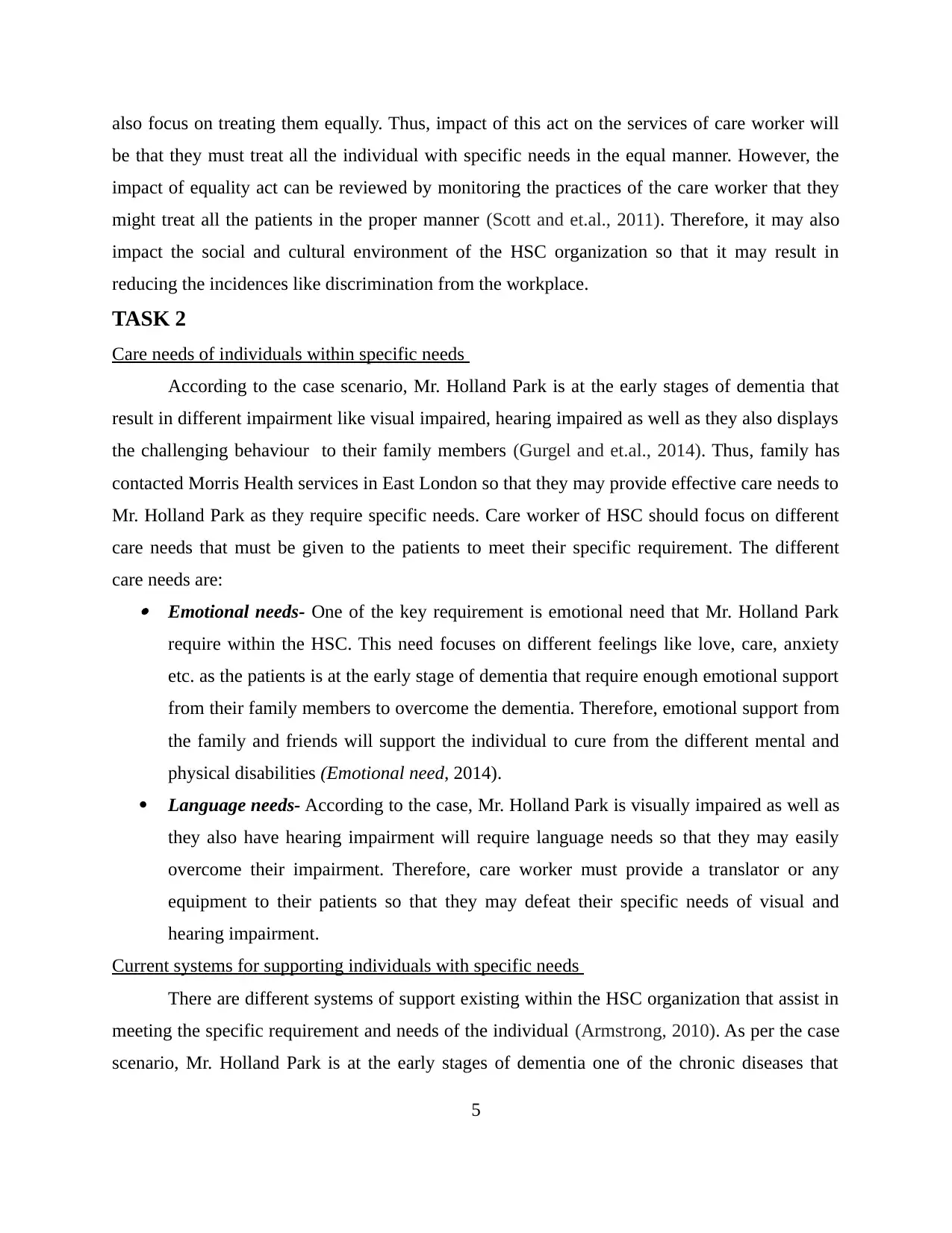
also focus on treating them equally. Thus, impact of this act on the services of care worker will
be that they must treat all the individual with specific needs in the equal manner. However, the
impact of equality act can be reviewed by monitoring the practices of the care worker that they
might treat all the patients in the proper manner (Scott and et.al., 2011). Therefore, it may also
impact the social and cultural environment of the HSC organization so that it may result in
reducing the incidences like discrimination from the workplace.
TASK 2
Care needs of individuals within specific needs
According to the case scenario, Mr. Holland Park is at the early stages of dementia that
result in different impairment like visual impaired, hearing impaired as well as they also displays
the challenging behaviour to their family members (Gurgel and et.al., 2014). Thus, family has
contacted Morris Health services in East London so that they may provide effective care needs to
Mr. Holland Park as they require specific needs. Care worker of HSC should focus on different
care needs that must be given to the patients to meet their specific requirement. The different
care needs are: Emotional needs- One of the key requirement is emotional need that Mr. Holland Park
require within the HSC. This need focuses on different feelings like love, care, anxiety
etc. as the patients is at the early stage of dementia that require enough emotional support
from their family members to overcome the dementia. Therefore, emotional support from
the family and friends will support the individual to cure from the different mental and
physical disabilities (Emotional need, 2014).
Language needs- According to the case, Mr. Holland Park is visually impaired as well as
they also have hearing impairment will require language needs so that they may easily
overcome their impairment. Therefore, care worker must provide a translator or any
equipment to their patients so that they may defeat their specific needs of visual and
hearing impairment.
Current systems for supporting individuals with specific needs
There are different systems of support existing within the HSC organization that assist in
meeting the specific requirement and needs of the individual (Armstrong, 2010). As per the case
scenario, Mr. Holland Park is at the early stages of dementia one of the chronic diseases that
5
be that they must treat all the individual with specific needs in the equal manner. However, the
impact of equality act can be reviewed by monitoring the practices of the care worker that they
might treat all the patients in the proper manner (Scott and et.al., 2011). Therefore, it may also
impact the social and cultural environment of the HSC organization so that it may result in
reducing the incidences like discrimination from the workplace.
TASK 2
Care needs of individuals within specific needs
According to the case scenario, Mr. Holland Park is at the early stages of dementia that
result in different impairment like visual impaired, hearing impaired as well as they also displays
the challenging behaviour to their family members (Gurgel and et.al., 2014). Thus, family has
contacted Morris Health services in East London so that they may provide effective care needs to
Mr. Holland Park as they require specific needs. Care worker of HSC should focus on different
care needs that must be given to the patients to meet their specific requirement. The different
care needs are: Emotional needs- One of the key requirement is emotional need that Mr. Holland Park
require within the HSC. This need focuses on different feelings like love, care, anxiety
etc. as the patients is at the early stage of dementia that require enough emotional support
from their family members to overcome the dementia. Therefore, emotional support from
the family and friends will support the individual to cure from the different mental and
physical disabilities (Emotional need, 2014).
Language needs- According to the case, Mr. Holland Park is visually impaired as well as
they also have hearing impairment will require language needs so that they may easily
overcome their impairment. Therefore, care worker must provide a translator or any
equipment to their patients so that they may defeat their specific needs of visual and
hearing impairment.
Current systems for supporting individuals with specific needs
There are different systems of support existing within the HSC organization that assist in
meeting the specific requirement and needs of the individual (Armstrong, 2010). As per the case
scenario, Mr. Holland Park is at the early stages of dementia one of the chronic diseases that
5
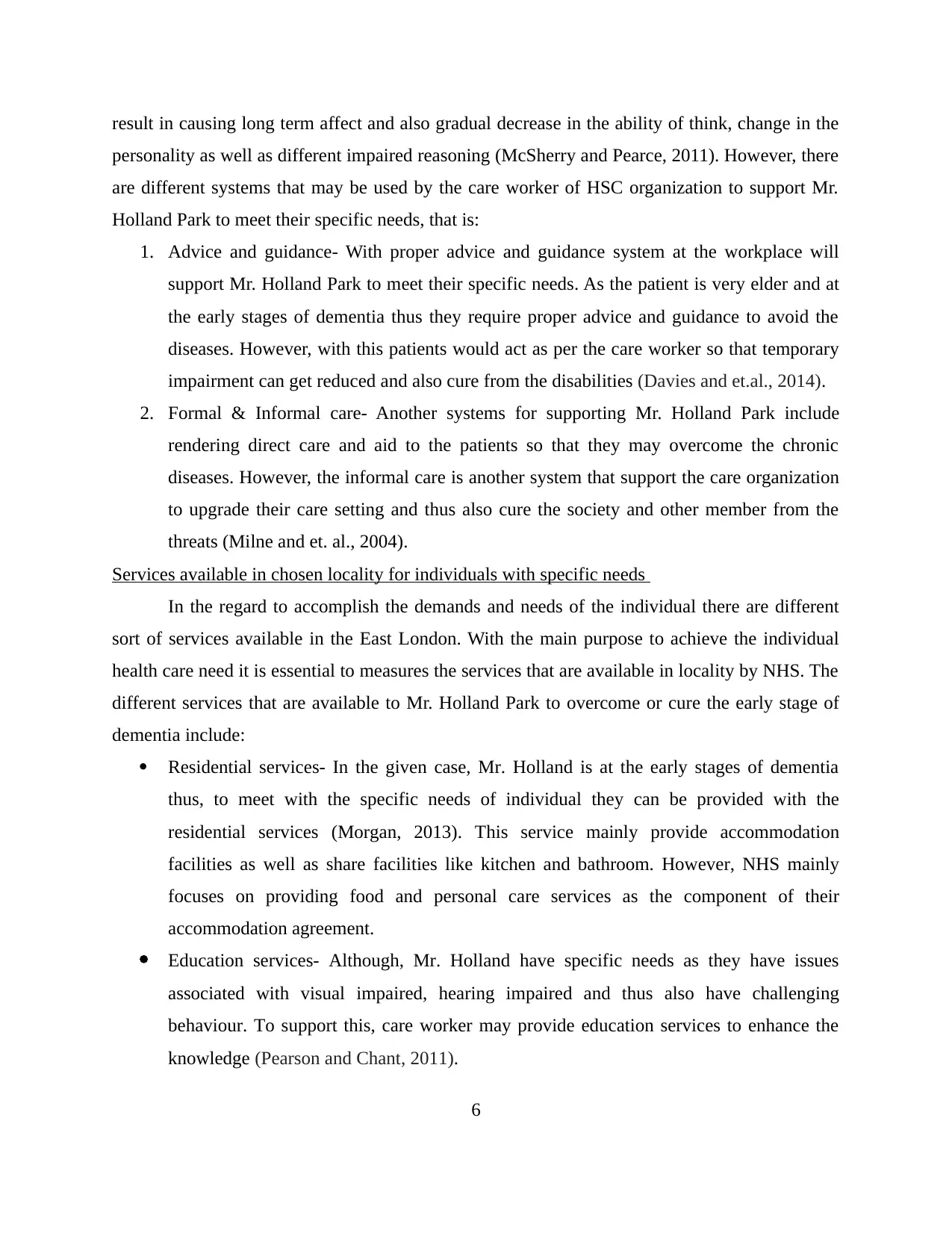
result in causing long term affect and also gradual decrease in the ability of think, change in the
personality as well as different impaired reasoning (McSherry and Pearce, 2011). However, there
are different systems that may be used by the care worker of HSC organization to support Mr.
Holland Park to meet their specific needs, that is:
1. Advice and guidance- With proper advice and guidance system at the workplace will
support Mr. Holland Park to meet their specific needs. As the patient is very elder and at
the early stages of dementia thus they require proper advice and guidance to avoid the
diseases. However, with this patients would act as per the care worker so that temporary
impairment can get reduced and also cure from the disabilities (Davies and et.al., 2014).
2. Formal & Informal care- Another systems for supporting Mr. Holland Park include
rendering direct care and aid to the patients so that they may overcome the chronic
diseases. However, the informal care is another system that support the care organization
to upgrade their care setting and thus also cure the society and other member from the
threats (Milne and et. al., 2004).
Services available in chosen locality for individuals with specific needs
In the regard to accomplish the demands and needs of the individual there are different
sort of services available in the East London. With the main purpose to achieve the individual
health care need it is essential to measures the services that are available in locality by NHS. The
different services that are available to Mr. Holland Park to overcome or cure the early stage of
dementia include:
Residential services- In the given case, Mr. Holland is at the early stages of dementia
thus, to meet with the specific needs of individual they can be provided with the
residential services (Morgan, 2013). This service mainly provide accommodation
facilities as well as share facilities like kitchen and bathroom. However, NHS mainly
focuses on providing food and personal care services as the component of their
accommodation agreement.
Education services- Although, Mr. Holland have specific needs as they have issues
associated with visual impaired, hearing impaired and thus also have challenging
behaviour. To support this, care worker may provide education services to enhance the
knowledge (Pearson and Chant, 2011).
6
personality as well as different impaired reasoning (McSherry and Pearce, 2011). However, there
are different systems that may be used by the care worker of HSC organization to support Mr.
Holland Park to meet their specific needs, that is:
1. Advice and guidance- With proper advice and guidance system at the workplace will
support Mr. Holland Park to meet their specific needs. As the patient is very elder and at
the early stages of dementia thus they require proper advice and guidance to avoid the
diseases. However, with this patients would act as per the care worker so that temporary
impairment can get reduced and also cure from the disabilities (Davies and et.al., 2014).
2. Formal & Informal care- Another systems for supporting Mr. Holland Park include
rendering direct care and aid to the patients so that they may overcome the chronic
diseases. However, the informal care is another system that support the care organization
to upgrade their care setting and thus also cure the society and other member from the
threats (Milne and et. al., 2004).
Services available in chosen locality for individuals with specific needs
In the regard to accomplish the demands and needs of the individual there are different
sort of services available in the East London. With the main purpose to achieve the individual
health care need it is essential to measures the services that are available in locality by NHS. The
different services that are available to Mr. Holland Park to overcome or cure the early stage of
dementia include:
Residential services- In the given case, Mr. Holland is at the early stages of dementia
thus, to meet with the specific needs of individual they can be provided with the
residential services (Morgan, 2013). This service mainly provide accommodation
facilities as well as share facilities like kitchen and bathroom. However, NHS mainly
focuses on providing food and personal care services as the component of their
accommodation agreement.
Education services- Although, Mr. Holland have specific needs as they have issues
associated with visual impaired, hearing impaired and thus also have challenging
behaviour. To support this, care worker may provide education services to enhance the
knowledge (Pearson and Chant, 2011).
6
⊘ This is a preview!⊘
Do you want full access?
Subscribe today to unlock all pages.

Trusted by 1+ million students worldwide
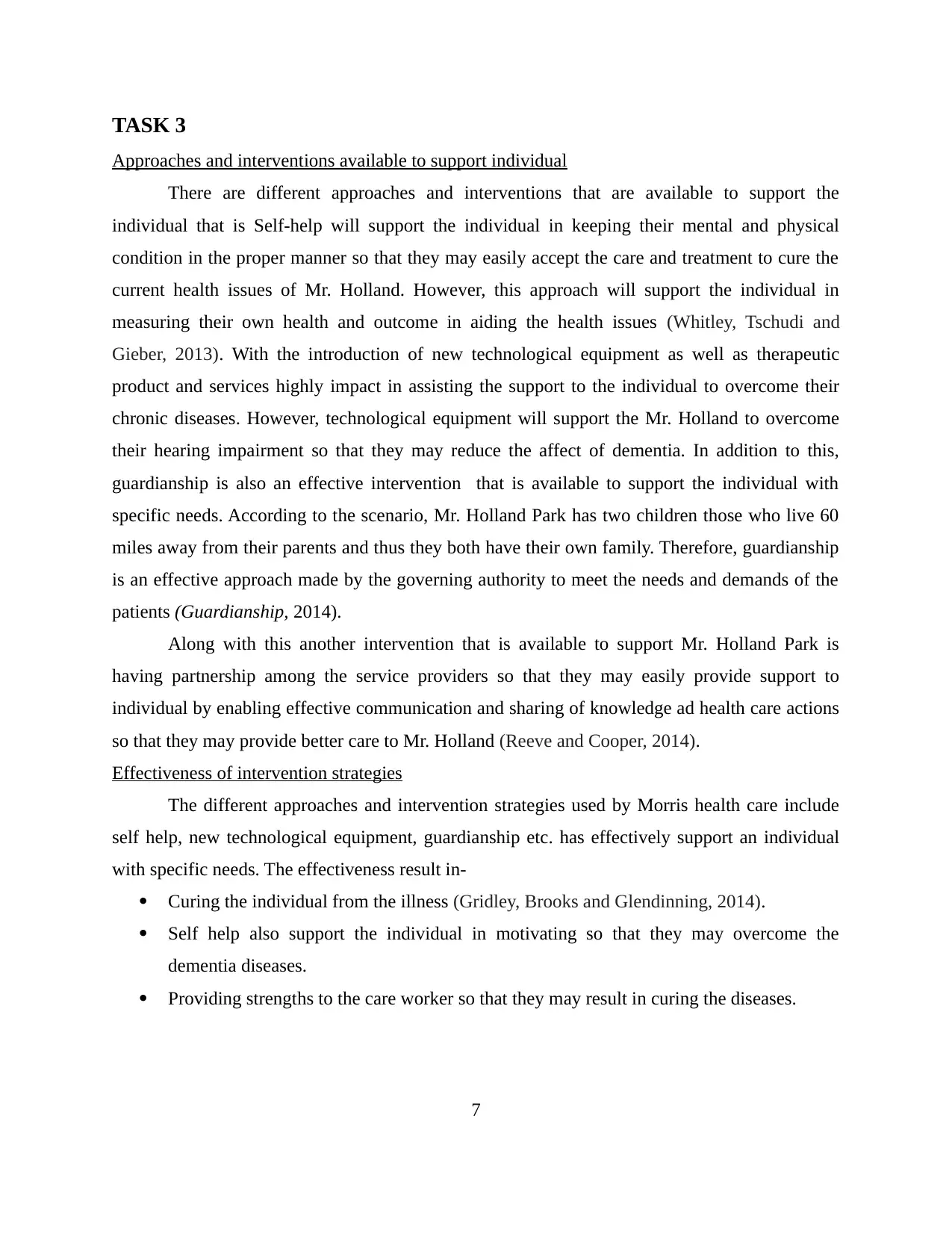
TASK 3
Approaches and interventions available to support individual
There are different approaches and interventions that are available to support the
individual that is Self-help will support the individual in keeping their mental and physical
condition in the proper manner so that they may easily accept the care and treatment to cure the
current health issues of Mr. Holland. However, this approach will support the individual in
measuring their own health and outcome in aiding the health issues (Whitley, Tschudi and
Gieber, 2013). With the introduction of new technological equipment as well as therapeutic
product and services highly impact in assisting the support to the individual to overcome their
chronic diseases. However, technological equipment will support the Mr. Holland to overcome
their hearing impairment so that they may reduce the affect of dementia. In addition to this,
guardianship is also an effective intervention that is available to support the individual with
specific needs. According to the scenario, Mr. Holland Park has two children those who live 60
miles away from their parents and thus they both have their own family. Therefore, guardianship
is an effective approach made by the governing authority to meet the needs and demands of the
patients (Guardianship, 2014).
Along with this another intervention that is available to support Mr. Holland Park is
having partnership among the service providers so that they may easily provide support to
individual by enabling effective communication and sharing of knowledge ad health care actions
so that they may provide better care to Mr. Holland (Reeve and Cooper, 2014).
Effectiveness of intervention strategies
The different approaches and intervention strategies used by Morris health care include
self help, new technological equipment, guardianship etc. has effectively support an individual
with specific needs. The effectiveness result in-
Curing the individual from the illness (Gridley, Brooks and Glendinning, 2014).
Self help also support the individual in motivating so that they may overcome the
dementia diseases.
Providing strengths to the care worker so that they may result in curing the diseases.
7
Approaches and interventions available to support individual
There are different approaches and interventions that are available to support the
individual that is Self-help will support the individual in keeping their mental and physical
condition in the proper manner so that they may easily accept the care and treatment to cure the
current health issues of Mr. Holland. However, this approach will support the individual in
measuring their own health and outcome in aiding the health issues (Whitley, Tschudi and
Gieber, 2013). With the introduction of new technological equipment as well as therapeutic
product and services highly impact in assisting the support to the individual to overcome their
chronic diseases. However, technological equipment will support the Mr. Holland to overcome
their hearing impairment so that they may reduce the affect of dementia. In addition to this,
guardianship is also an effective intervention that is available to support the individual with
specific needs. According to the scenario, Mr. Holland Park has two children those who live 60
miles away from their parents and thus they both have their own family. Therefore, guardianship
is an effective approach made by the governing authority to meet the needs and demands of the
patients (Guardianship, 2014).
Along with this another intervention that is available to support Mr. Holland Park is
having partnership among the service providers so that they may easily provide support to
individual by enabling effective communication and sharing of knowledge ad health care actions
so that they may provide better care to Mr. Holland (Reeve and Cooper, 2014).
Effectiveness of intervention strategies
The different approaches and intervention strategies used by Morris health care include
self help, new technological equipment, guardianship etc. has effectively support an individual
with specific needs. The effectiveness result in-
Curing the individual from the illness (Gridley, Brooks and Glendinning, 2014).
Self help also support the individual in motivating so that they may overcome the
dementia diseases.
Providing strengths to the care worker so that they may result in curing the diseases.
7
Paraphrase This Document
Need a fresh take? Get an instant paraphrase of this document with our AI Paraphraser
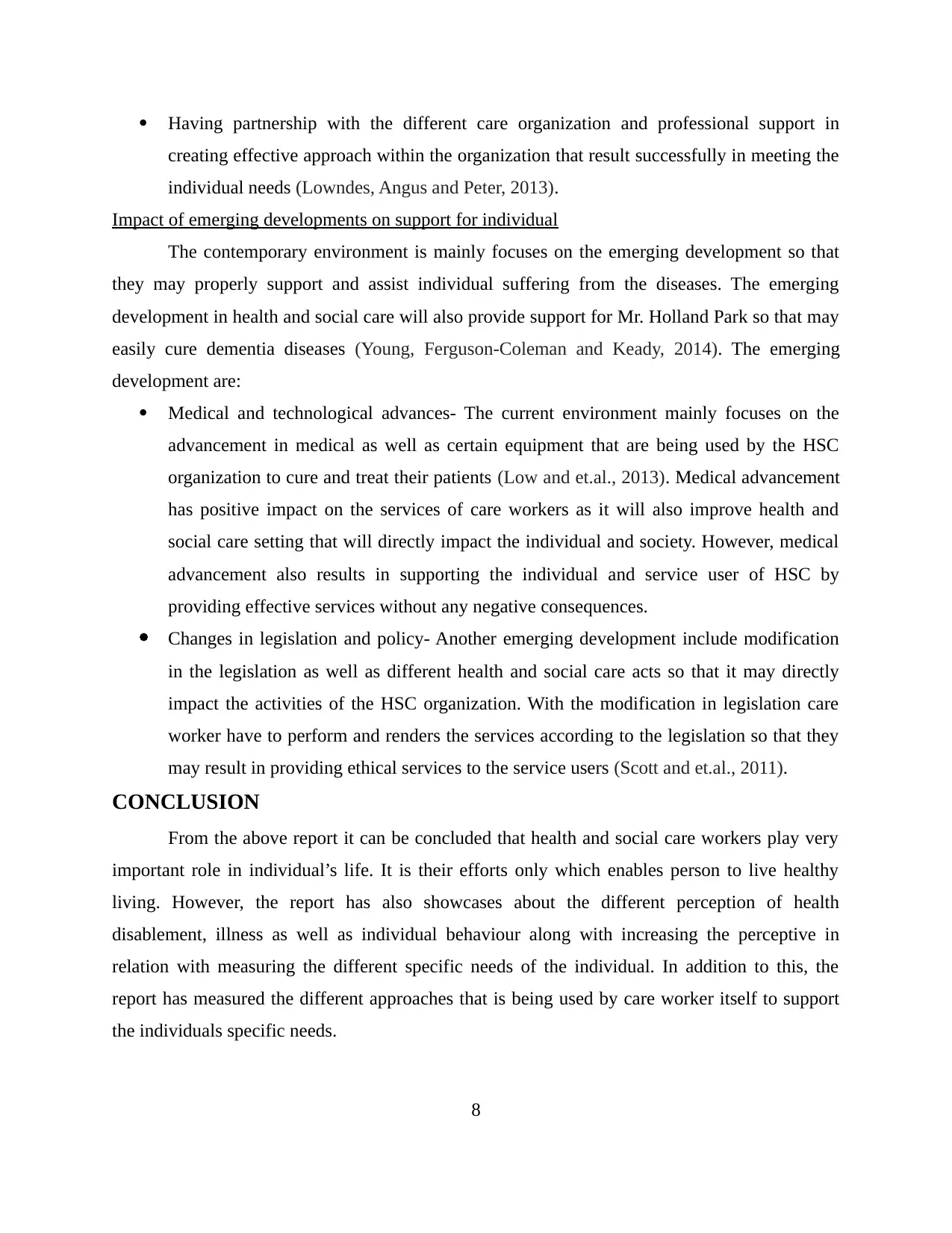
Having partnership with the different care organization and professional support in
creating effective approach within the organization that result successfully in meeting the
individual needs (Lowndes, Angus and Peter, 2013).
Impact of emerging developments on support for individual
The contemporary environment is mainly focuses on the emerging development so that
they may properly support and assist individual suffering from the diseases. The emerging
development in health and social care will also provide support for Mr. Holland Park so that may
easily cure dementia diseases (Young, Ferguson‐Coleman and Keady, 2014). The emerging
development are:
Medical and technological advances- The current environment mainly focuses on the
advancement in medical as well as certain equipment that are being used by the HSC
organization to cure and treat their patients (Low and et.al., 2013). Medical advancement
has positive impact on the services of care workers as it will also improve health and
social care setting that will directly impact the individual and society. However, medical
advancement also results in supporting the individual and service user of HSC by
providing effective services without any negative consequences.
Changes in legislation and policy- Another emerging development include modification
in the legislation as well as different health and social care acts so that it may directly
impact the activities of the HSC organization. With the modification in legislation care
worker have to perform and renders the services according to the legislation so that they
may result in providing ethical services to the service users (Scott and et.al., 2011).
CONCLUSION
From the above report it can be concluded that health and social care workers play very
important role in individual’s life. It is their efforts only which enables person to live healthy
living. However, the report has also showcases about the different perception of health
disablement, illness as well as individual behaviour along with increasing the perceptive in
relation with measuring the different specific needs of the individual. In addition to this, the
report has measured the different approaches that is being used by care worker itself to support
the individuals specific needs.
8
creating effective approach within the organization that result successfully in meeting the
individual needs (Lowndes, Angus and Peter, 2013).
Impact of emerging developments on support for individual
The contemporary environment is mainly focuses on the emerging development so that
they may properly support and assist individual suffering from the diseases. The emerging
development in health and social care will also provide support for Mr. Holland Park so that may
easily cure dementia diseases (Young, Ferguson‐Coleman and Keady, 2014). The emerging
development are:
Medical and technological advances- The current environment mainly focuses on the
advancement in medical as well as certain equipment that are being used by the HSC
organization to cure and treat their patients (Low and et.al., 2013). Medical advancement
has positive impact on the services of care workers as it will also improve health and
social care setting that will directly impact the individual and society. However, medical
advancement also results in supporting the individual and service user of HSC by
providing effective services without any negative consequences.
Changes in legislation and policy- Another emerging development include modification
in the legislation as well as different health and social care acts so that it may directly
impact the activities of the HSC organization. With the modification in legislation care
worker have to perform and renders the services according to the legislation so that they
may result in providing ethical services to the service users (Scott and et.al., 2011).
CONCLUSION
From the above report it can be concluded that health and social care workers play very
important role in individual’s life. It is their efforts only which enables person to live healthy
living. However, the report has also showcases about the different perception of health
disablement, illness as well as individual behaviour along with increasing the perceptive in
relation with measuring the different specific needs of the individual. In addition to this, the
report has measured the different approaches that is being used by care worker itself to support
the individuals specific needs.
8

9
⊘ This is a preview!⊘
Do you want full access?
Subscribe today to unlock all pages.

Trusted by 1+ million students worldwide
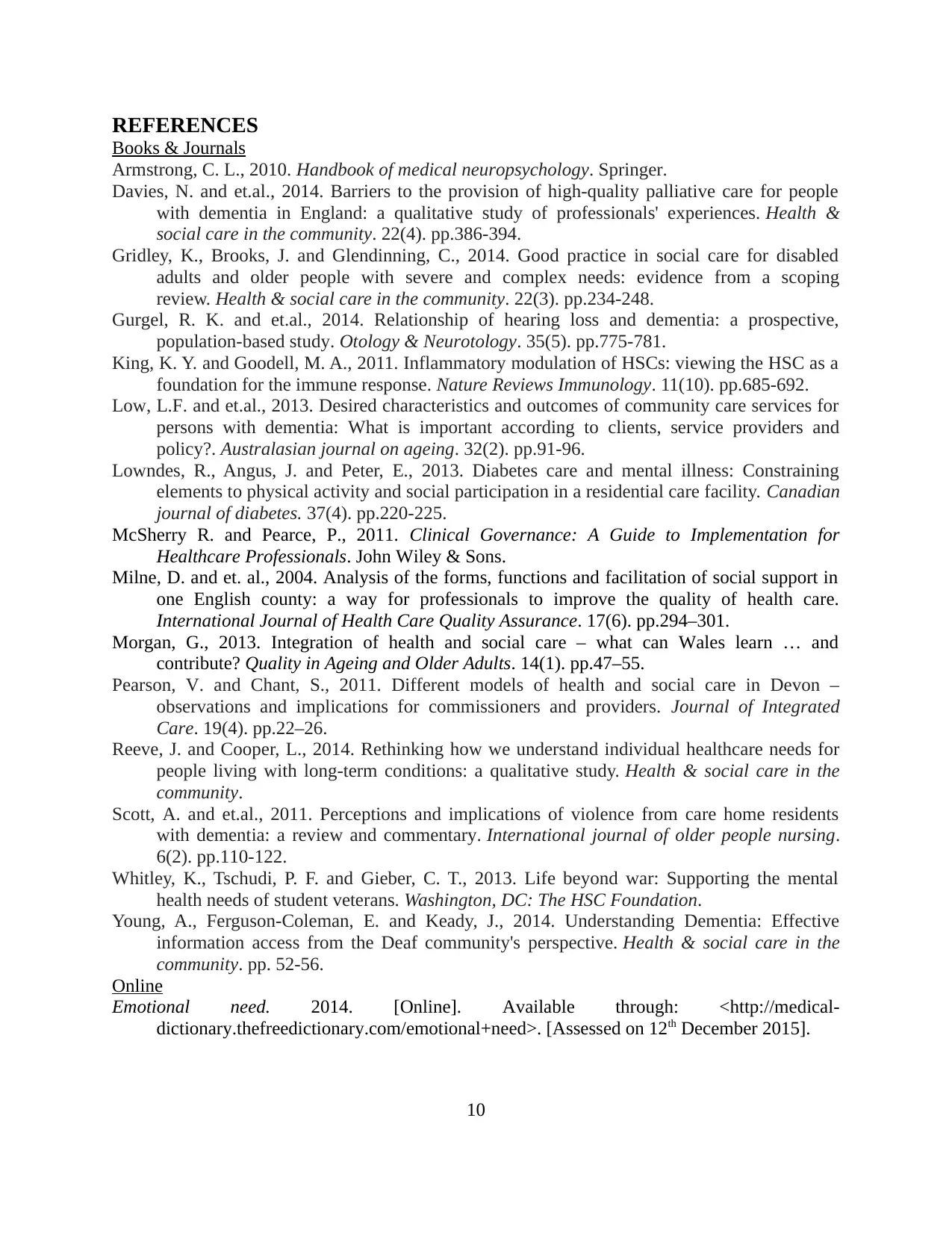
REFERENCES
Books & Journals
Armstrong, C. L., 2010. Handbook of medical neuropsychology. Springer.
Davies, N. and et.al., 2014. Barriers to the provision of high‐quality palliative care for people
with dementia in England: a qualitative study of professionals' experiences. Health &
social care in the community. 22(4). pp.386-394.
Gridley, K., Brooks, J. and Glendinning, C., 2014. Good practice in social care for disabled
adults and older people with severe and complex needs: evidence from a scoping
review. Health & social care in the community. 22(3). pp.234-248.
Gurgel, R. K. and et.al., 2014. Relationship of hearing loss and dementia: a prospective,
population-based study. Otology & Neurotology. 35(5). pp.775-781.
King, K. Y. and Goodell, M. A., 2011. Inflammatory modulation of HSCs: viewing the HSC as a
foundation for the immune response. Nature Reviews Immunology. 11(10). pp.685-692.
Low, L.F. and et.al., 2013. Desired characteristics and outcomes of community care services for
persons with dementia: What is important according to clients, service providers and
policy?. Australasian journal on ageing. 32(2). pp.91-96.
Lowndes, R., Angus, J. and Peter, E., 2013. Diabetes care and mental illness: Constraining
elements to physical activity and social participation in a residential care facility. Canadian
journal of diabetes. 37(4). pp.220-225.
McSherry R. and Pearce, P., 2011. Clinical Governance: A Guide to Implementation for
Healthcare Professionals. John Wiley & Sons.
Milne, D. and et. al., 2004. Analysis of the forms, functions and facilitation of social support in
one English county: a way for professionals to improve the quality of health care.
International Journal of Health Care Quality Assurance. 17(6). pp.294–301.
Morgan, G., 2013. Integration of health and social care – what can Wales learn … and
contribute? Quality in Ageing and Older Adults. 14(1). pp.47–55.
Pearson, V. and Chant, S., 2011. Different models of health and social care in Devon –
observations and implications for commissioners and providers. Journal of Integrated
Care. 19(4). pp.22–26.
Reeve, J. and Cooper, L., 2014. Rethinking how we understand individual healthcare needs for
people living with long‐term conditions: a qualitative study. Health & social care in the
community.
Scott, A. and et.al., 2011. Perceptions and implications of violence from care home residents
with dementia: a review and commentary. International journal of older people nursing.
6(2). pp.110-122.
Whitley, K., Tschudi, P. F. and Gieber, C. T., 2013. Life beyond war: Supporting the mental
health needs of student veterans. Washington, DC: The HSC Foundation.
Young, A., Ferguson‐Coleman, E. and Keady, J., 2014. Understanding Dementia: Effective
information access from the Deaf community's perspective. Health & social care in the
community. pp. 52-56.
Online
Emotional need. 2014. [Online]. Available through: <http://medical-
dictionary.thefreedictionary.com/emotional+need>. [Assessed on 12th December 2015].
10
Books & Journals
Armstrong, C. L., 2010. Handbook of medical neuropsychology. Springer.
Davies, N. and et.al., 2014. Barriers to the provision of high‐quality palliative care for people
with dementia in England: a qualitative study of professionals' experiences. Health &
social care in the community. 22(4). pp.386-394.
Gridley, K., Brooks, J. and Glendinning, C., 2014. Good practice in social care for disabled
adults and older people with severe and complex needs: evidence from a scoping
review. Health & social care in the community. 22(3). pp.234-248.
Gurgel, R. K. and et.al., 2014. Relationship of hearing loss and dementia: a prospective,
population-based study. Otology & Neurotology. 35(5). pp.775-781.
King, K. Y. and Goodell, M. A., 2011. Inflammatory modulation of HSCs: viewing the HSC as a
foundation for the immune response. Nature Reviews Immunology. 11(10). pp.685-692.
Low, L.F. and et.al., 2013. Desired characteristics and outcomes of community care services for
persons with dementia: What is important according to clients, service providers and
policy?. Australasian journal on ageing. 32(2). pp.91-96.
Lowndes, R., Angus, J. and Peter, E., 2013. Diabetes care and mental illness: Constraining
elements to physical activity and social participation in a residential care facility. Canadian
journal of diabetes. 37(4). pp.220-225.
McSherry R. and Pearce, P., 2011. Clinical Governance: A Guide to Implementation for
Healthcare Professionals. John Wiley & Sons.
Milne, D. and et. al., 2004. Analysis of the forms, functions and facilitation of social support in
one English county: a way for professionals to improve the quality of health care.
International Journal of Health Care Quality Assurance. 17(6). pp.294–301.
Morgan, G., 2013. Integration of health and social care – what can Wales learn … and
contribute? Quality in Ageing and Older Adults. 14(1). pp.47–55.
Pearson, V. and Chant, S., 2011. Different models of health and social care in Devon –
observations and implications for commissioners and providers. Journal of Integrated
Care. 19(4). pp.22–26.
Reeve, J. and Cooper, L., 2014. Rethinking how we understand individual healthcare needs for
people living with long‐term conditions: a qualitative study. Health & social care in the
community.
Scott, A. and et.al., 2011. Perceptions and implications of violence from care home residents
with dementia: a review and commentary. International journal of older people nursing.
6(2). pp.110-122.
Whitley, K., Tschudi, P. F. and Gieber, C. T., 2013. Life beyond war: Supporting the mental
health needs of student veterans. Washington, DC: The HSC Foundation.
Young, A., Ferguson‐Coleman, E. and Keady, J., 2014. Understanding Dementia: Effective
information access from the Deaf community's perspective. Health & social care in the
community. pp. 52-56.
Online
Emotional need. 2014. [Online]. Available through: <http://medical-
dictionary.thefreedictionary.com/emotional+need>. [Assessed on 12th December 2015].
10
Paraphrase This Document
Need a fresh take? Get an instant paraphrase of this document with our AI Paraphraser
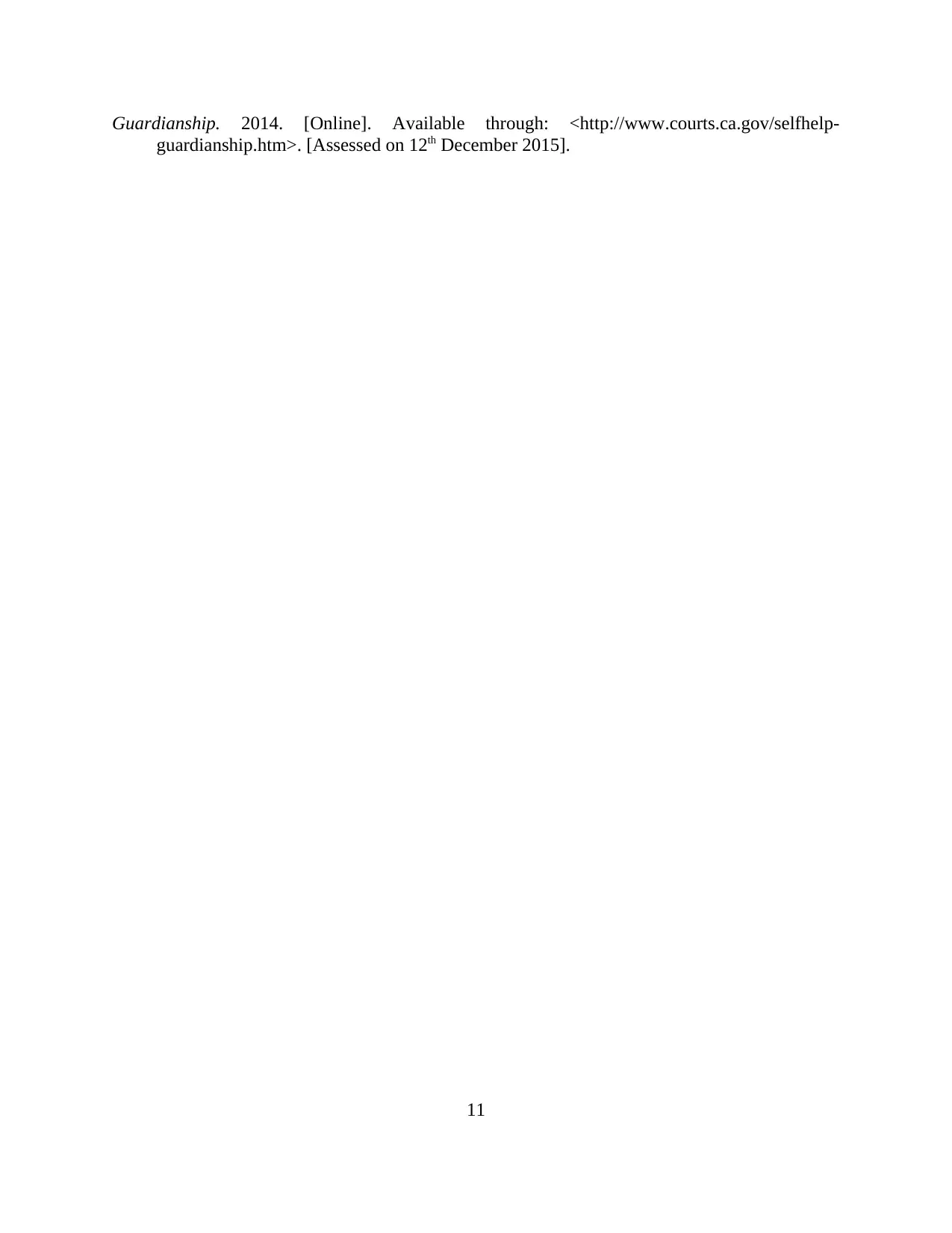
Guardianship. 2014. [Online]. Available through: <http://www.courts.ca.gov/selfhelp-
guardianship.htm>. [Assessed on 12th December 2015].
11
guardianship.htm>. [Assessed on 12th December 2015].
11
1 out of 11
Related Documents
Your All-in-One AI-Powered Toolkit for Academic Success.
+13062052269
info@desklib.com
Available 24*7 on WhatsApp / Email
![[object Object]](/_next/static/media/star-bottom.7253800d.svg)
Unlock your academic potential
Copyright © 2020–2026 A2Z Services. All Rights Reserved. Developed and managed by ZUCOL.





